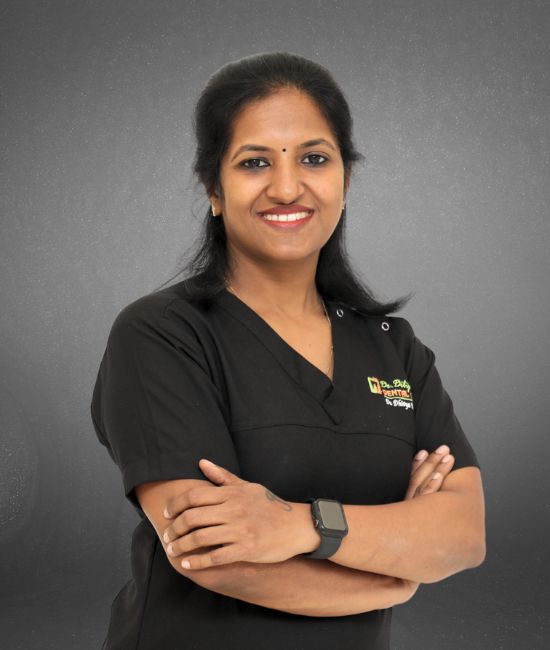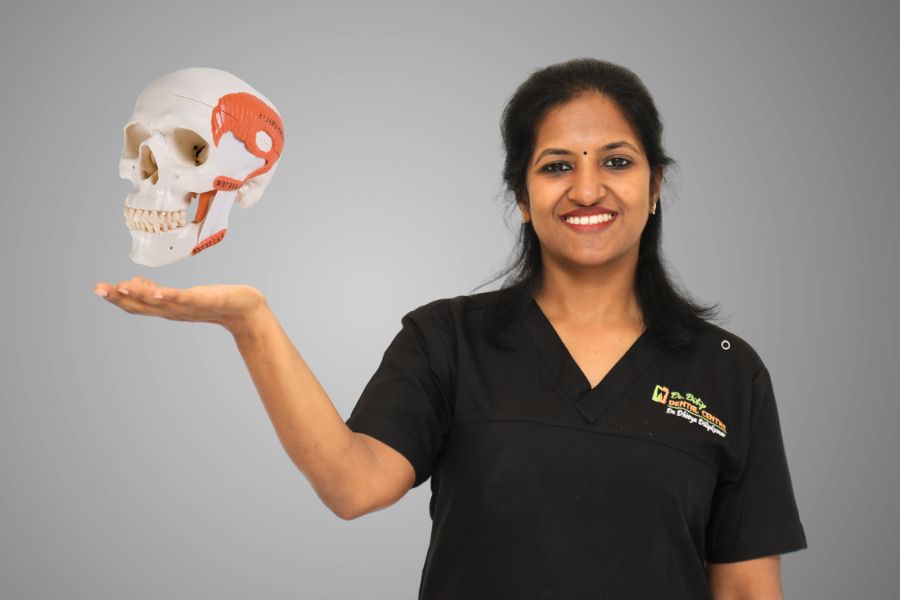Dr. Dhivya Dilipkumar is one of the famous certified TMJ specialists in Chennai who specialises in treating Temporomandibular Joint Disorder (TMJ). Call 044 – 4556 7465 to book an appointment.
Why Choose Dr. Dilip Dental Centre for TMJ Issues – TMJ Pain
Choose Dr. Dilip Dental Centre for expert care and personalized treatment plans for TMJ disorders.
Dr. Dhivya Dilipkumar, our TMJ specialist at Dr. Dilip Dental Centre, is the first orthodontist in India to have received a fellowship in oro-facial pain, temporomandibular joint (TMJ) disorders, and sleep disorders. She has received this esteemed fellowship from Roseman University, under the expert mentorship of Dr. Davis Thomas.
She has treated 1000+ TMJ patients suffering from chronic pain. Her track record of reviews and follow-ups of over 5 years with her patients is the key to her unanimously positive feedback as a medical practitioner.
Through her vast experience, modern facilities, and comprehensive approach, we offer a range of effective treatments. Receive compassionate care, patient education, and long-term wellness solutions for your TMJ pain. Take the first step towards a pain-free future by scheduling an appointment today. Your smile and well-being are our priorities.
TMJ PAIN
The temperomandibular joint (TMJ) is the joint that connects your mandible (lower jaw) to your skull. The joint is found on both sides of your head in front of your ears. It allows your jaw to open and close, enabling you to speak and eat.
SIGNS AND SYMPTOM
Symptoms Includes:
- Jaw pain
- Jaw clicking and popping
- Pain while eating
- Ear pain
- Ear ringing & stuffiness
- Pain in/around eyes
- Tightness in head
- Headaches/dizziness
- Stiff or sore jaw muscles
- Pain in the temple area
- Locking of the jaw joint

TMJ issues can either be a joint problem that leads to clicking sounds, or a muscle problem which leads to pain in the facial region.
Joint Problems:
i) Disk displacement with reduction
When the articular disc is outside the fossa, but able to come back to position, ensuring in a clicking/popping sound.
ii) Disk displacement without reduction
When disk displacement is chronic, there is a difficulty in opening the mouth (known as closed lock). This happens when the articular disk is displaced without getting reduced.
Muscle problems:
Muscle tightness can lead to several other symptoms such as headaches, facial pains, migraines, pain in/around eyes.What Are Risk Factors for TMJ Syndrome?
Stress:
When stressed out, your facial muscles are contracted, which leads to muscle spasms in the face, consequently causing trigger points in those muscles. The pain from these trigger points are transferred to other areas, which causes headaches and facial pain, akin to migraines.Gender:
Women are more likely to develop TMJ syndrome than men.
Age:
TMJ syndrome is more common in adults between the ages of 20 and 40.
Pain tolerance:
People who are more sensitive to pain may be more likely to develop TMJ syndrome.Genetics:
Some people may be more genetically predisposed to developing TMJ syndrome.Occupational factors:
People who clench or grind their teeth, or who have jobs that involve a lot of jaw movement, may be more likely to develop TMJ syndrome.Trauma:
A jaw injury can increase your risk of developing TMJ syndrome.Book An Appointment Now!
Our TMJ Specialist in Chennai:

Prof. Dr. Dhivya Dilipkumar Mds, Phd, F.tmd, F. Ofp, Fsl, Fdsm
Orthodontist, Orofacial/TMJ Pain Specialist & Sleep Disorder Specialist
TMJ FAQs
What is the difference between TMJ and TMD?
TMJ stands for temporomandibular joint, while TMD stands for temporomandibular joint dysfunction. TMD is a group of conditions that affect the TMJ and the surrounding muscles and ligaments.
How do we diagnose your TMJ Problems?
The treatment for TMJ syndrome will vary depending on the individual case. Some common treatments include:
Muscle Palpation:
Medications
Physical Therapy
Trigger Point Injections:
Treatment of Disk Displacements
Book an appointment with the best TMJ specialist in Chennai
If you are experiencing similar TMJ symptoms, please contact us through the below avenues. For further information, you can also watch our YouTube videos where Dr. Dhivya Dilipkumar elucidates key exercises and massages to provide temporary relief from pain.
